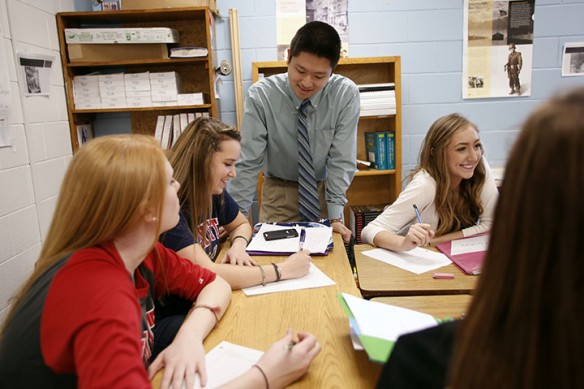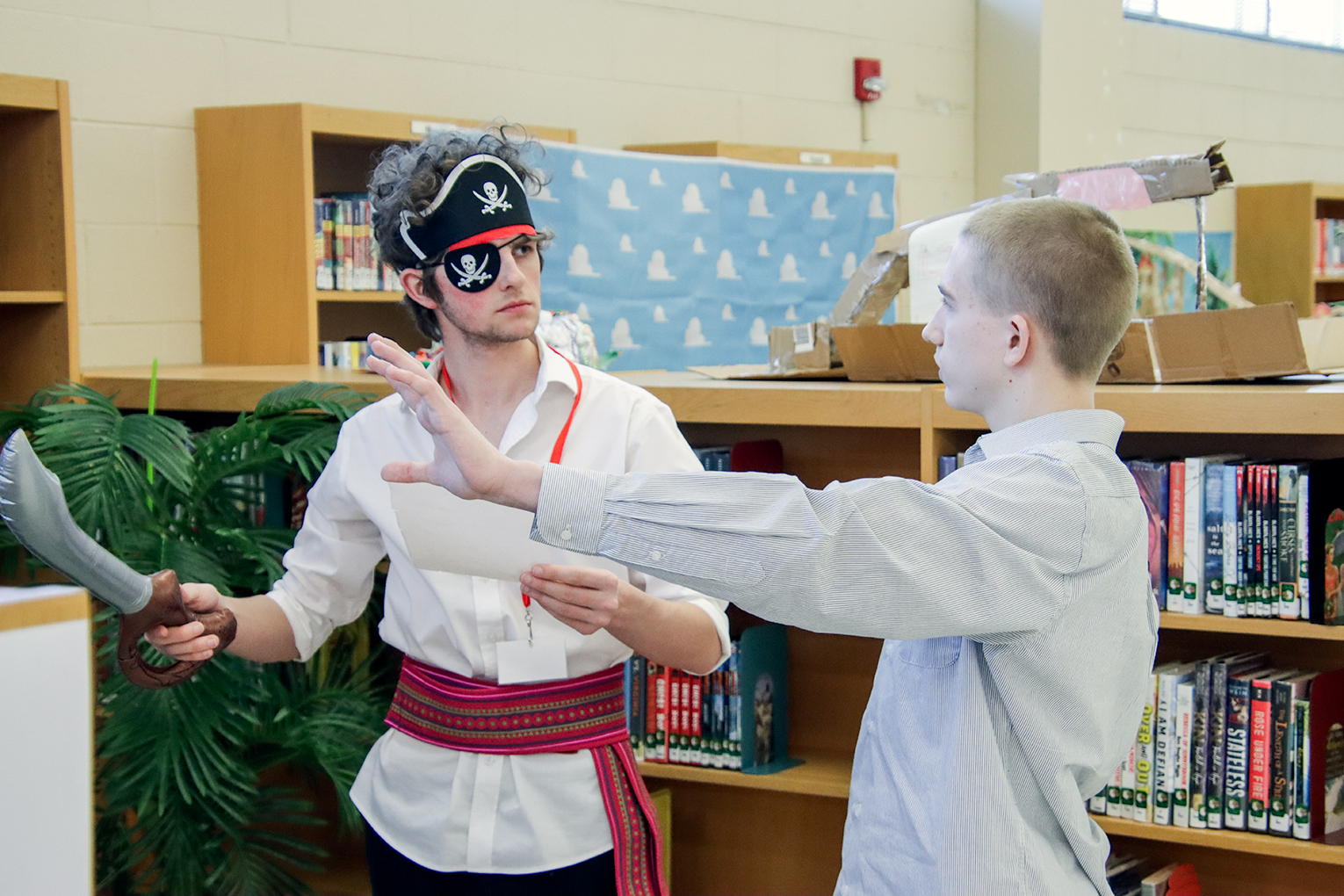
Brison Harvey works with juniors Aimee Mudd, McKenna Clark and Heaven Leisner-Herr on causes of the Cold War during US History class at Lafayette High School (Fayette County). Harvey is one of 65 Kentucky educators who are is part of the Common Assignment program in which they collaborate with Colorado teachers for shared lessons.
Photo by Amy Wallot, March 16, 2015
By Brenna R. Kelly
Brenna.kelly@education.ky.gov
While learning about the Cold War students in Brison Harvey’s U.S. History class at Lafayette High School independently analyzed the testimony of a person speaking before the 1947 House Committee on Un-American Activities.
Then, grouped by the person they studied, students discussed their subject’s motives, feelings and words in front of the rest of the class.
“The hope is that by discussing it they are forced to think about it just a little bit deeper, to hear other people’s ideas,” Harvey said.
Having the discussion and listening to their peers’ discussions will also give the students more information to draw upon when they write a final paper for the unit in which they must argue the role of Sen. Joseph McCarthy in the Red Scare.
More than 1,100 miles away, students in Colorado are using the same exercise to learn about the Cold War. As the unit progresses, the students will also complete the same assignments and final paper.
It’s all part of the Common Assignment Study, (CAS) a project aimed at bringing teachers in Kentucky and Colorado together to improve teacher’s instructional practices and increase the number of students who master the skills called for in their states’ academic standards.
“The idea is to see what it looks like when you break down the barriers of isolation, when you have an opportunity to work with colleagues across the nation,” said Renee Boss, initiative director at The Fund for Transforming Education in Kentucky, which partnered with the Colorado Education Initiative for the study funded in part by the Bill & Melinda Gates Foundation.
In addition to the teachers learning from each other and working to improve the quality of instruction, the research study also seeks to determine whether common assignments can be used to measure teacher effectiveness.
The study began in 2013 and has involved nearly two dozen teachers in Kenton and Fayette counties who met with Colorado teachers in Seattle to create units for English, history and biology. Within the units are performance-based assessments that use Literacy Design Collaborative (LDC) tools which can help teachers understand if students are grasping the material.
“We’re trying to look at moving beyond some of the traditional multiple choice assessments and looking at more performance-based assessment opportunities so students have a greater chance to demonstrate their mastery of the material,” Boss said.
After teaching the CAS units the teachers met again, analyzed the student work and revised the lessons. This school year more teachers joined the study, including several from Simpson, Fleming and Washington counties, bringing the number of Kentucky participants to 65. The research portion of the study will conclude at the end of this school year.
As part of the research study teachers had to submit student work and complete other paperwork, but the small amount of extra work was worth it, said Robin Reid, who teaches AP U.S. History at Lafayette.
“The biggest benefit for me has been seeing my students do really well in writing,” Reid said. “I’ll jump through a lot of hoops if that is what happens in the end.”
In addition to seeing her students succeed, the study has also given Reid confidence in her ability to teach writing.
“I think for social studies teachers trying to struggle with the Kentucky Core Academic Standards and learning how to teach writing, the Common Assignment study has just been a life-saver as far as giving you very good support and collaboration to help you do that,” she said.
Another benefit she discovered was being able to use the student work from the unit as evidence of student growth for the Teacher Professional Growth and Effectiveness System.
By doing a pre-assessment, teachers can then look for improvement in the final paper.
“So it’s not an extra thing you are doing,” she said, “it just makes everything flow.”
In addition to student growth, the common assignments could be a tool to measure teacher effectiveness because under the Teacher Professional Growth and Effectiveness System teachers need to use common rubrics to measure student growth, Boss said. That’s what the researchers are trying to determine, she said.
“PGES is calling upon teachers and districts to do some more unified work, to have at least some point within the year, where they are having common tasks,” Boss said.
According to results from the first year of the study, almost three-quarters of teachers surveyed said that the second CAS unit they taught raised their expectations for student work and 62 percent said it helped them increase the rigor of their teaching.
Teachers also said that exchanging ideas with colleagues from other districts and states encouraged them to try new activities and approaches which helped to make lessons more challenging.
Richie Kowalewski, who teaches English at Dixie Heights High School (Kenton County), said he benefited from new practices he learned about from the other teachers.
“Everybody has their different tools as to how they would teach a lesson so you bring all those different perspectives in and there’s a variety of ways you could approach teaching the same skill,” he said.
He also enjoyed having time specifically devoted to reviewing the lessons and analyzing the student work.
“When we are getting together with the Common Assignment there’s nothing else that we have to work on or worry about or grade,” Kowalewski said. “We are just looking at the work so that’s nice.”
One of the units Kowalewski helped develop was on explanatory writing in which students had to explore the effects that social media has had on language.
He was impressed with the results.
“When you do the unit at full capacity you’re going to get good student work in the end,” he said.
Now Kenton County is considering using the Common Assignment units at all three of the district’s high schools as way to align its accelerated sophomore English classes, he said.
Even though the study will be completed this year, The Fund will continue to provide support to the districts already in the program and hopes to expand the program to more districts, Boss said.
Harvey said he hopes more teachers across the state get a chance to participate. As a third year teacher, Harvey said he learned from working with the more experienced teachers.
“Anytime that you pull teachers together, it does change the way you think about things,” he said.
“Working hands on with these other teachers, feeding off of their ideas, it’s really been helpful.”
He also hopes to keep in touch with the Colorado teachers he met through the study as they both continue to teach the CAS units.
“Hopefully those partnerships can continue through emailing or teleconferences,” he said. “It would be really awesome and I hope that we can maintain that connection.”
MORE INFO…
Renee Boss Renee@thefundky.org
Robin Reid Robin.Reid@fayette.kyschools.us
Richie Kowalewski Richard.Kowalewski@kenton.kyschools.us
Brison Harvey Brison.Harvey@fayette.kyschools.us




Leave A Comment